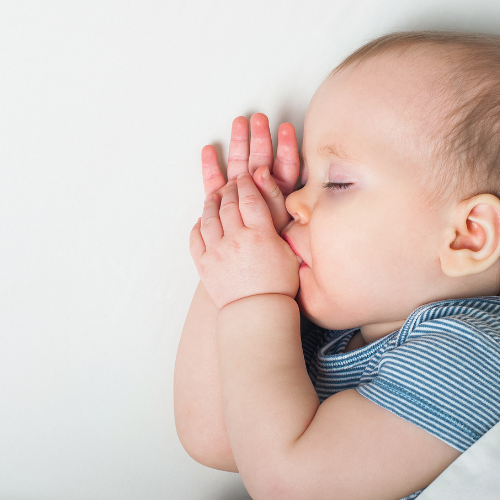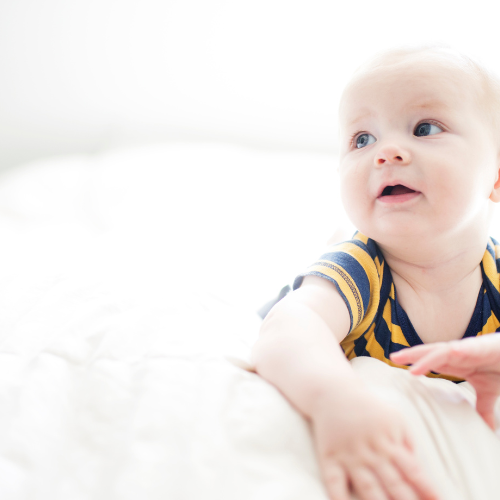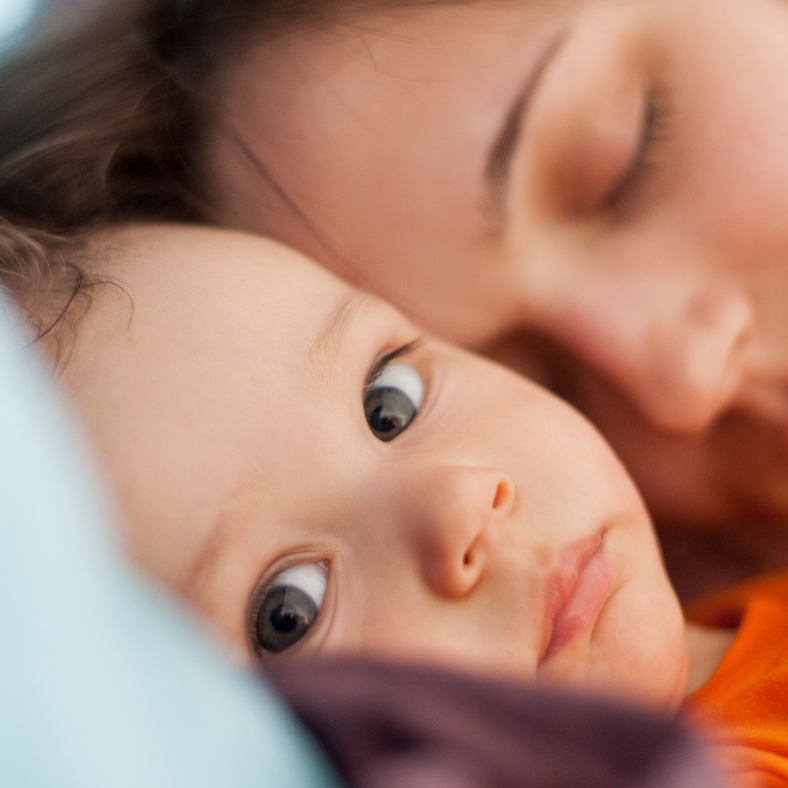Firstly, I really don’t love the phrase “sleep train”. This is an outdated term and was what professionals and parents referred to back in the day when babies were left alone to cry. When you hear “sleep training” you might automatically think of Cry It Out – a terribly traumatising method for both parents and baby. So for the purpose of this post, let’s rather call it sleep coaching or sleep teaching. After all, we’re not training our babies, we’re guiding them and offering them support while they consolidate sleep and learn new ways of settling.
Sleep teaching with me looks like:
1. Looking for red flags in terms of potential underlying medical factors that might be playing a role in sleep then referring out to the necessary medical professional to rule it out and/or treat.
2. Setting your little one up for success – including optimising the sleep environment, figuring out the perfect schedule to work with your baby’s homeostatic sleep drive and unique sleep needs as well as optimising feeds and solids (when age appropriate).
3. Switching over to more sustainable methods of settling (if this is what you want) – doing this in a way that suits your baby’s temperament, your parenting style and doing it at a pace that you are comfortable with. You can do this through my Happy Self-Settler Guide.


I didn’t have to sleep coach my first born. Well at least not in the “formal” sense. I was pretty set, however, on getting on top of sleep hygiene early on. My first born took a dummy, my second didn’t and so that was a different experience!
Hold up. I’m not saying that if your baby takes a dummy you won’t have to sleep coach .There have been plenty of Mums I have worked with who have needed to ditch the dummy because it caused multiple night wakes and was not sustainable to continue with, so ditching the dummy was necessary. If you think you need to ditch the dummy, see my post on “Will ditching the dummy help with my baby’s sleep?“
So why did I choose to sleep coach my second baby?
My second born, Levi, hit the 4 Month Progression HARD. He started waking every 2 hours from about 10pm and so feeding him back to sleep became the quickest way to get him back to sleep. This resulted in some reverse cycling (when a baby starts taking in more calories overnight than during the day) which kept me in this vicious cycle of him waking overnight because he was also genuinely hungry. I was EXHAUSTED. In fact, that’s an understatement. My anxiety was through the roof, I was cranky and short tempered, I had no energy left to spend quality time with my oldest, and my husband was getting the brunt of Monster Mel.
I needed to do something about this and fast if I was to avoid traumatising my older child and doing damage to my marriage. I needed to sleep and so did my baby.
Luckily I was actually studying Infant and Child Sleep at the time so all the foundations were in place – optimal routine, appropriate awake times, perfect sleep environment etc. So I knew that Levi was just sensitive to the way he settled off to sleep needing that same way (feeding) to resettle throughout the night and therefore the only way for his sleep to improve was to learn how to self-settle.
Quick side note: Some babies’ sleep improves just by optimising the schedule and sleep environment without even having to do any sleep coaching or teaching self-settling. Grab my 3-12 Month Guide which covers all of this and so much more to improve sleep without even having to sleep teach!
What does self-settling even mean?
From about 3 months old, the way your baby gets to sleep and back to sleep overnight becomes a sleep association (what your baby associates with and often needs to get to sleep). The longer this is used for them to get to sleep, the deeper rooted the association becomes. This is why some babies who were previously self-settling, suddenly need assistance after a bout of illness for example. This is because when babies are unwell they struggle to sleep or stay asleep so baby is then rocked or fed to settle and then an association develops. Some babies will develop an association in a matter of 4-5 days!
From the 4 month progression, which can happen anytime between 3-5 months old, your little one will often need that association to be replicated every time they wake overnight. If this involves a parent or other caregiver it can become quite taxing. This is often when parents look to “sleep train”. Some babies can be assisted to sleep at the start of bedtime and sleep all the way through without your help, that means they are connecting sleep cycles and are actually resettling all by themselves. If that’s the case, and you love how you are putting your little one to sleep, then it’s not a problem!
When your little one can be placed in their crib fully awake and fall asleep on their own without any support from you, this is called self-settling. Self-settling is a skill that your baby may need to learn in order to link sleep cycles and achieve longer naps and overnight sleep. This can be learned as early as 4 months old, which is when your baby is developmentally ready to learn independent sleep skills. Prior to this , your baby does not have the neurological ability to learn to self-settle.
How do I even begin teaching my baby this skill?
If you are wanting to change the way your little one is settled to sleep, whether it is because it has become too taxing on you or is resulting in fragmented night sleep, there are many ways you can do this. A good way to start is by doing less of what you are currently doing over time. You can even start to layer in other sleep associations that don’t require as much hands on support from you so that when you remove the one that has been problematic for you (eg. rocking or feeding), when you start to settle your little one in their crib, they have other sleep associations to draw from.
Does sleep coaching have to involve leaving my baby to cry?
Absolutely not! If you are very uncomfortable with the idea of leaving the room while your baby learns to self-settle, you don’t have to! And if you hate the idea of your little one crying altogether then there are ways you can improve sleep without teaching self-settling or teaching self-settling very gently and in stages moving forward as and when you and your little one are ready. This is where my Happy Self-Settler Guide is SUPER handy! It has a variety of methods (from the most gentle, to the quicker ones) to choose from that guides you step-by-step to teach your little one the skill of self-settling.
When is the best age to sleep coach?
You can start setting your little one up for success as early as 3 weeks old. No, you won’t be teaching self-settling but you can work on sleep hygiene and getting them used to falling asleep in their crib. I have a great method for this in my Newborn Guide along with other tips and tricks to set your little one up for sleep success. Some parents who follow this guide never have to teach self-settling (or “sleep train’) because their little one has been practicing these skills really gently from early on.
In terms of teaching your baby to self-settle, I have found that there is a “sweet spot” around 5/6 months old but I have helped parents teach self-settling successfully from as early as 4 months old right up to 3 years old! The sweet spot is when your little one adapts super easily and they don’t protest change as much. A combination of the sleep association not being so deeply rooted and where they are at developmentally, assists the process at this age. From about 8/9 months, a lot of babies get seriously annoyed that you are changing the way you settle them and protest HARD. Developmentally they are a lot more aware and can put up quite a fight. Other factors like separation anxiety and learning object permanence also play a role here and can put a spanner in the sleep teaching works. Toddlers will also protest a lot but they have a better understanding and acquire self-settling skills quite quickly. Once your child is in a big bed, sleep training can be very difficult but absolutely not impossible. We have to employ different strategies to older babies and toddlers but with optimising day sleep, consistency and clear boundaries, I have had great success with all age groups.
If you want further help on this topic, check out my other blog posts or you can book a consult with me and we can figure it out together:






One Comment
Comments are closed.